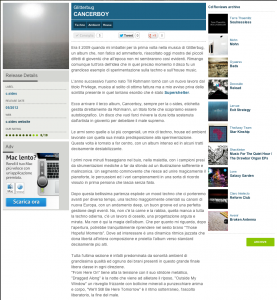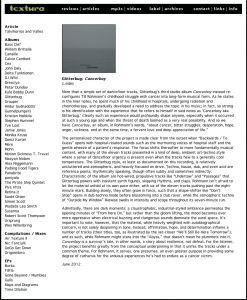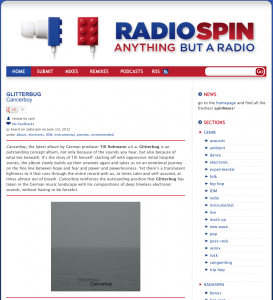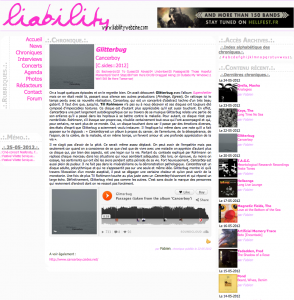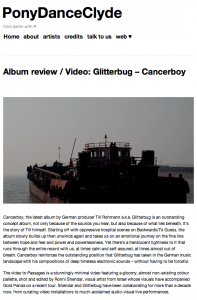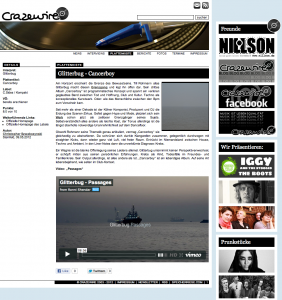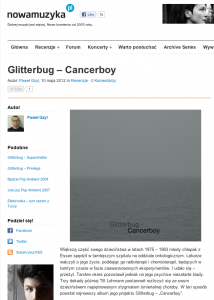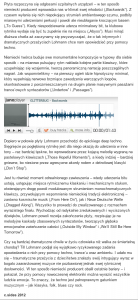To have ‘Cancerboy’ be reviewed on motor.de – one of Germanys oldest rock and indie websites- came as a total surprise. And actually I have to say that this is one of my favorite reviews so far… thanks dear people at motor.de and especially to the reviewer Clara Fiedler for taking the time, listening carefully and making up her own mind about the album!
You can read the article here.
***
Die Geschichte hinter “Cancerboy” – dem Album des vielbeschäftigten Kölner Produzenten Till Rohmann – ist seine eigene. Der ehemals krebskranke Klangkünstler liefert mit dem Konzeptalbum seines Projekts Glitterbug eine lebendige Vertonung des Grenzgangs. Von Clara Fiedler
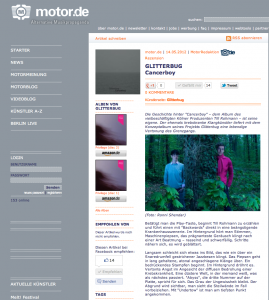
Betätigt man die Play-Taste, beginnt Till Rohmann zu erzählen und führt einen mit “Backwards” direkt in eine beängstigende Krankenhausszenerie. Im Hintergrund hört man Stimmen, Maschinenpiepsen, das prägnanteste Geräusch klingt nach einer Art Beatmung – rasselnd und schwerfällig. Schritte nähern sich, es wird geblättert.
Langsam schleicht sich etwas ins Bild, das wie ein über ein Snaredrumfell gestrichener Jazzbesen klingt. Das Piepsen geht in lang gehaltene, atonal angeschlagene Klänge über. Ein bedrückendes Stampfen beginnt. Im Hintergrund dröhnt es. Vertonte Angst im Angesicht der diffusen Bedrohung einer Krebskrankheit. Eine düstere Welt, in der niemand weiß, was als nächstes passiert. “Abyss”, die dritte Nummer auf der Platte, spricht für sich. Das Grau der Ungewissheit bleibt. Der Abgrund wird sichtbar, man sieht die Steilwände im Fall vorbeiziehen. Mit “Undertow” ist man am tiefsten Punkt angekommen.
Jeglicher Anlauf, sich in die Geschichte hineinzufühlen, wäre Anmaßung, Verständnis eine Lüge, denn erlebt hat es nur der Produzent selbst. Was wirklich berührt, ist die Leichtigkeit, die Trotz der unheimlichen Bedrückung durchklingt. Es ist, als würde Rohmann im Nachhinein reflektieren, anstatt sein Drama zu wiederholen. Er zwingt niemanden, es zieht einen nicht hinein. Er erzählt, lässt teilhaben an Gefühls- und Bewusstseinszuständen, die nicht viele Menschen erlebt haben. Die bewegende Geschichte ist ein Teil von ihm, nicht aber seine gesamte Identität. Es bleibt der Respekt vor seinem Mut, nicht aber Mitleid.
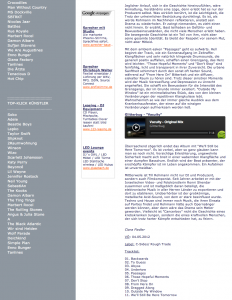
Mit dem ambient-esken “Passages” geht es aufwärts. Hell beginnt der Track, wie ein Sonnenaufgang im Zeitraffer. Klangflächen und sehr natürlich klingende Drumsounds, die generell positiv auffallen, schaffen einen Grenzgang, das Herz wird leichter. “Those Hopeful Moments” und “Don’t Stop” sind feinfühlig, licht und transparent in ihrer Zuversicht. Die urbane Sanftheit schimmert durch den sonst oft harten Sound, während auf “From Here On” Bitterkeit und ein diffuser, eiskalter Raum zu hören sind. Trotz dieser sinistren Momente wird der Musik Verzweiflung und Depresssion zu Unrecht angeheftet. Sie schafft ein Bewusstsein für die Intensität des Grenzgangs, der im Grunde immer existiert. “Outside My Window” ist ein minimalistisches Stück, das von den kleinen Veränderungen der repetitiven Klangkulisse lebt. Wahrscheinlich so wie der immer gleiche Ausblick aus dem Krankenhausfenster, der einen auf die winzigen Veränderungen aufmerksam werden ließ.
Überraschend zögerlich endet das Album mit “We’ll Still be Here Tomorrow”. Es ist vorbei, aber so ganz glauben kann man es noch nicht. Vorsichtige Erleichterung, ungewohnte Sicherheit macht sich breit in einer wabernden Klangfläche und einer dumpfen Bassdrum. Endlich wird der Beat präsenter, der erschöpfte Kämpfer ist im Leben angekommen. Ein Aufatmen ist unvermeidbar.
Mittlerweile ist Till Rohmann nicht nur DJ und Produzent, sondern auch Filmkomponist. Seit Jahren arbeitet er mit der Israelischen Video- und Fotokünstlerin Ronni Shendar zusammen und ist maßgeblich daran beteiligt, die elektronische Musik in aller Herren Länder zu exportieren und dort zu etablieren. Unüberhörbar ist der grobkörnige, metallische Acid-Sound, von dem er stark beeinflusst wurde. Techno und House sind immer noch Musik, die ihren Einsatz auf Parties findet und Rohmann hätte auch Opernsänger werden können, aber dann wäre das Drama sein Metier geworden. Vielleicht ist “Cancerboy” nicht die Geschichte eines krebskranken Jungen, sondern die eines kraftvollen Menschen, der sich trotz harter Kämpfe entschieden hat, zu feiern.
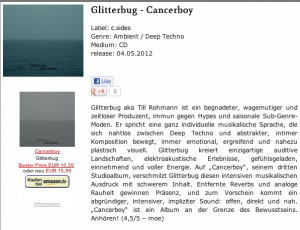 Glitterbug aka Till Rohmann ist ein begnadeter, wagemutiger und zeitloser Produzent, immun gegen Hypes und saisonale Sub-Genre-Moden. Er spricht eine ganz individuelle musikalische Sprache, die sich nahtlos zwischen Deep Techno und abstrakter, intimer Komposition bewegt, immer emotional, ergreifend und nahezu plastisch visuell. Glitterbug kreiert einzigartige auditive Landschaften, elektroakustische Erlebnisse, gefühlsgeladen, einnehmend und voller Energie. Auf „Cancerboy“, seinem dritten Studioalbum, verschmilzt Glitterbug diesen intensiven musikalischen Ausdruck mit schwerem Inhalt. Entfernte Reverbs und analoge Rauheit gewinnen Präsenz, und zum Vorschein kommt ein abgründiger, intensiver, impliziter Sound: offen, direkt und nah. „Cancerboy“ ist ein Album an der Grenze des Bewusstseins. Anhören! (4,5/5 – moe)
Glitterbug aka Till Rohmann ist ein begnadeter, wagemutiger und zeitloser Produzent, immun gegen Hypes und saisonale Sub-Genre-Moden. Er spricht eine ganz individuelle musikalische Sprache, die sich nahtlos zwischen Deep Techno und abstrakter, intimer Komposition bewegt, immer emotional, ergreifend und nahezu plastisch visuell. Glitterbug kreiert einzigartige auditive Landschaften, elektroakustische Erlebnisse, gefühlsgeladen, einnehmend und voller Energie. Auf „Cancerboy“, seinem dritten Studioalbum, verschmilzt Glitterbug diesen intensiven musikalischen Ausdruck mit schwerem Inhalt. Entfernte Reverbs und analoge Rauheit gewinnen Präsenz, und zum Vorschein kommt ein abgründiger, intensiver, impliziter Sound: offen, direkt und nah. „Cancerboy“ ist ein Album an der Grenze des Bewusstseins. Anhören! (4,5/5 – moe) 